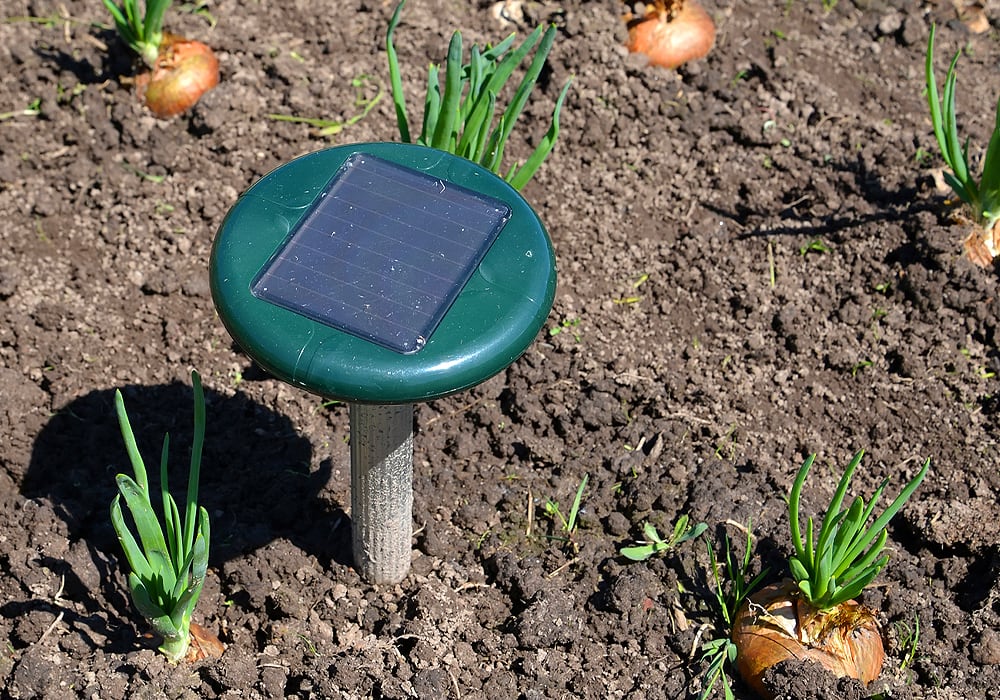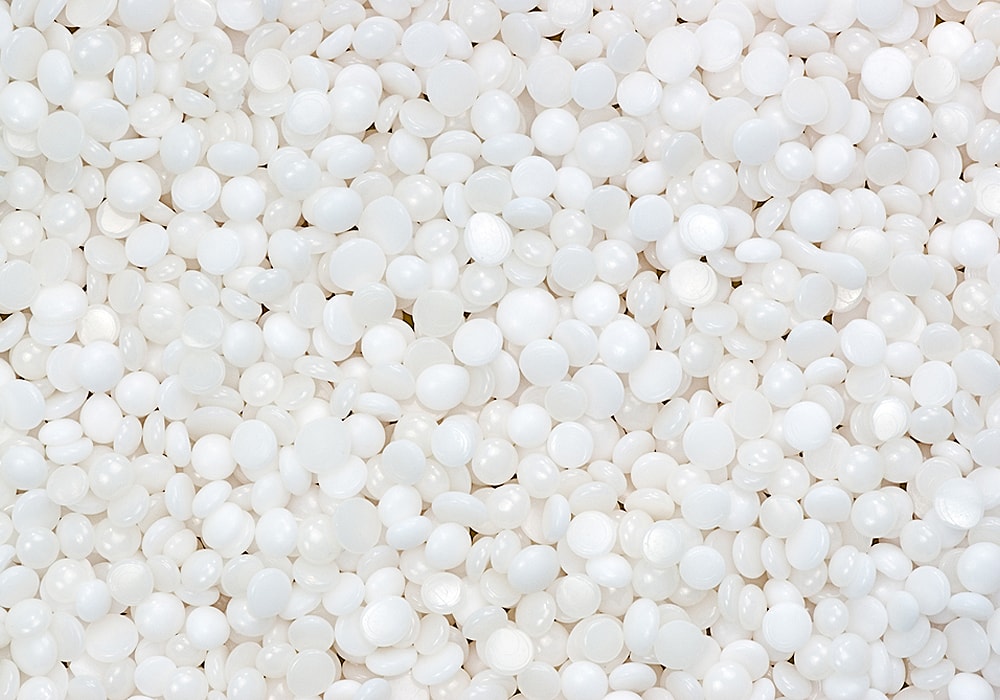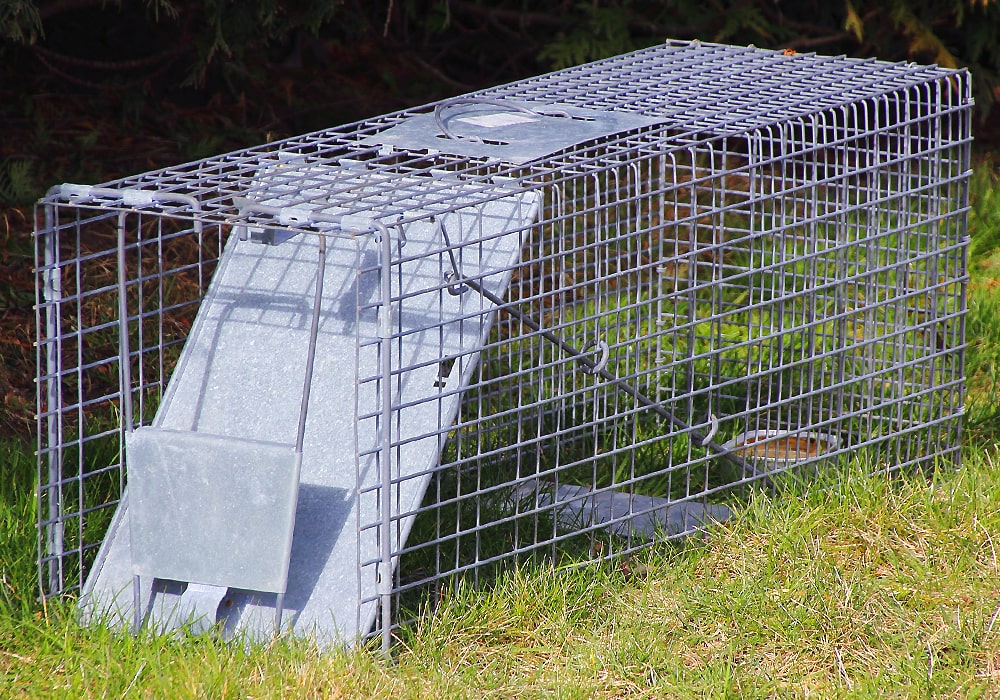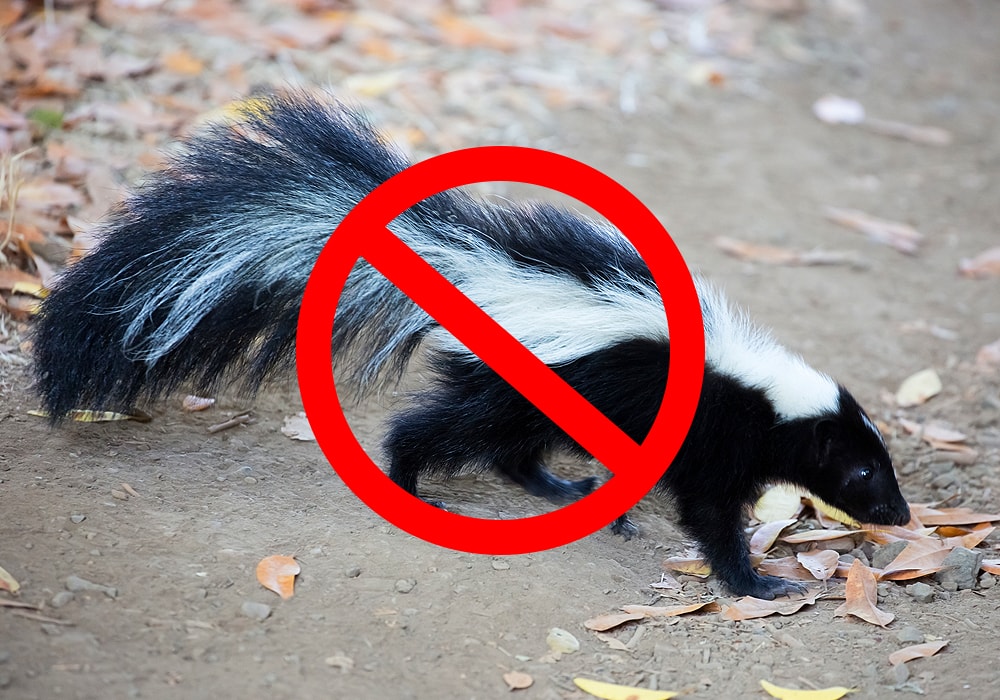Skunks are generally peaceful little fellows, but their reputation for stink is well-deserved.
They may help out with managing pests and grubs, but having one living on your property is not a pleasant prospect.
So if you want to know how to get rid of skunks effectively and humanely, read on!
1. Install a motion detection sprinkler
Skunks aren’t that difficult to scare off. A sudden noise or movement is enough to send them scampering. So if you have a skunk in the backyard, a motion detection sprinkler could be the solution to your prayers.
A motion detection sprinkler is a great option because it basically uses a spray of water as a skunk deterrent.
The shuffling of the animal sets off the sensor and a jet of water suddenly erupts with a whirring noise. The combination of water and noise is a non-toxic, harmless, and natural way to get rid of skunks.

The key to an effective motion detection sprinkler is a good sensor. This one uses both heat- and motion-activated, increasing its sensitivity.
It also allows you to automate when it turns on. If you want to keep skunks away and save on water costs, you customize the settings, so the sprinkler only works at night when these animals are active.
Install the device by driving the spike into the ground and connecting it to the nearest water source. Adjust the sensor to the skunk height, so it detects them more easily.
2. Install an ultrasonic skunk repellent
What skunks lack in the eyesight department, they make up for with their excellent sense of hearing. They use this to listen to mating calls and to detect danger.
So if you’re wondering how to scare away a skunk, one easy way is by taking advantage of their sensitive ears. Remember, the best way to get rid of skunks is to make your home an unlivable habitat.
If a skunk hears this annoying sound whenever it enters your property, he’s less likely to return. This is where an ultrasonic skunk repellent comes in. Simply install it on the ground and turn it on.

The movement will trigger the sensor and the device emits an annoying high-pitched sound that will repel skunks. This ultrasonic skunk repellent has some additional features that come in handy.
It has flashing LED lights that serve to deter skunks in addition to the ultrasonic sound. It’s best installed in a spot with direct sunlight to make the most out of this solar-powered device.
You don’t have to worry about inclement weather because its stake allows it to be driven securely into the ground, and its casing is made to resist the elements, whether rain or shine.
3. Sprinkle skunk repellent granules around the yard
A lot of people want to know how to keep skunks away from gardens. These little critters like to dig into the soil for grubs and make holes in the ground for their dens. So what’s the best skunk deterrent to stop them from digging?
Skunk repellent granules make a good choice for burrowing skunks. They’re in solid form and blend in with the soil, so skunks cannot easily remove them.
Just sprinkle a handful into existing skunk holes every few days and you’ll be able to eliminate skunks from your garden. What repels skunks in the granules, you might ask. These work because they use a scent that will keep skunks away.

A good example is this skunk repellant that uses fox urine. The smell of skunk predators’ urine detracts these animals from visiting your home. Note that this stuff smells really bad, so make sure not to place it anywhere humans or pets hang out.
Meanwhile, this skunk repellent granule brand makes use of 10% castor oil to get rid of skunks. A little goes a long way, with 1lb sprinkled over 500 square feet of garden. After applying, water lightly to better release the aroma.
Note that these granules aren’t made of skunk poison. They use natural products that emit unpleasant aromas. You don’t need to worry about its effect on the quality of your soil or chemical residues in your garden harvest.
4. Build a (electric) fence around your property
If you’re at your wit’s end thinking about how to get rid of skunks in the yard, then you might consider building a fence along its perimeter.
Use a strong PVC garden mesh with small holes to secure your home. You can install this on an existing wood post fencing to be able to keep out smaller animals.
Make sure to cut the mesh such that a foot or so can be buried under the ground. This prevents animals from getting inside by digging under. You can also install your own electric fence using a fence charger with aluminum wire.

This delivers a short but readily-felt shock to small animals that you are trying to keep out of your property.
Buy ground rods at the hardware store and position them at regular intervals around your home. It’s best to place these in areas with moist soil as that helps conduct electricity better. But if this isn’t feasible, you can moisten the ground with water to achieve the same conditions.
Set up the aluminum wire at 6-12 inches from the ground. It’s important that the wire is at the right height because touching this is what will keep skunks away.
5. Install night lights in your yard
Skunks are mostly active at night, and they’re used to going about their business in the dark. If you’re wondering how to get rid of skunks using this information, it’s simple: light it up!
Any random flash of light will serve to repel skunks. The sudden change in their usually dark environment is enough to stun them and think that something is amiss. Frightened, they leave.
So if you’re wondering how to get rid of skunks under deck or how to get rid of skunks under your house, all you have to do is position it in light in the dark space for a couple of days. With their daytime sleep disturbed, they will eventually look for a better place to stay.

If you want to get rid of a skunk in your yard, you can add lights for outdoors that are designed to withstand the elements.
These must be kept on all night to detract skunks and other nocturnal pests. However, this arrangement tends to take up a lot of electricity, so usually, people go for solar-powered ones.
Another energy-saving option are these outdoor pathway lights that have low voltage but high brightness–perfect for skunk prevention. These are perfect for those who want a no-fuss installation. Just drive the lights into the ground, cover the wires with a little soil, and plugin!
6. Remove ALL food sources
If you’re wondering, “What do skunks eat?” the answer is simple: anything edible. They will go through your garbage.
They will eat fallen fruit; they will scavenge your bird feeder, they will gobble up whatever you leave out for your pets. So if you want to get skunks out of your yard, you’re going to have to cover all your bases.
Take a walk around your house and see if accessible food is the reason behind your skunk problem. Be on the lookout for anything that these omnivores could get their hands on and think about how best to secure them.

If you see tipped-over garbage cans, consider buying a new set that allows you to lock the lid. If you see fallen fruits on the ground, arrange for your family members to take turns clearing them out when in season.
Keep pet and bird food tightly secured, especially when stored in the shed or garage. Refrain from feeding your pets outdoors, or at least make sure to bring in their bowls during the night when skunks are most active.
If you notice the skunk gravitates towards the bird feeders, place a tray directly underneath to prevent seeds and grains from falling to the ground where the skunk can eat it.
7. Use ammonia or mothballs to repel skunks
Aside from having an excellent sense of hearing, skunks also have highly sensitive noses–much more so than humans.
That’s why a lot of skunk deterrents are made with pungent ingredients. Product developers know their sense of smell is keen, so they ask themselves, “what smell do skunks hate?” and use these for pest control.
You can apply the same principle with home remedies to keep skunks away. A good DIY skunk repellent is to use store-bought ammonia. Making your own skunk ammonia-based deterrent is as easy as leaving a bowl of the stuff in areas the animals frequent.

You could also get rid of skunks with ammonia by soaking rags in the liquid and hanging them in strategic locations. It’s best to do this instead of making an ammonia spray because that will allow the smell to dissipate very quickly, leading to constant reapplication.
Another good option for a homemade skunk deterrent is to use mothballs. But wait, why do mothballs keep skunks away? Isn’t it made for moths? Mothballs repel skunks because they are made of para-dichlorobenzene, a chemical that causes nausea and dizziness.
You can put mothballs in the garden by dropping a few into an old stocking and hanging it up. Give it a few days and you’ll see for yourself that mothballs and skunks are like oil and water.
8. Use flashing night lights to scare ALL wildlife away
Effective wildlife and skunk control methods need not involve harming animals. By understanding their behavior, one can humanely deter them.
For example, we know that there are skunk natural predators that skunks are naturally afraid of. These are usually large birds of prey like the great horned owl and red-tailed hawk.
They usually stand very still, with only the blinking of their red eyes as a movement. So how to get rid of a skunk in your yard while applying this information? By mimicking the predators, of course.

This innovative solar-powered wildlife deterrent light does so perfectly. Its flashing lights are circular and colored red to mimic glowing, blinking eyes in the dark. Sound scary? You bet it is.
Even humans who don’t know what it is will get frightened, so you can be sure it’ll be great for repelling skunks. Another big advantage of this particular device is how easy it is to use.
The only thing you have to think about is positioning. It must receive full sunlight for it to charge using its solar-powered battery. Just hang it with a wire in a strategic location and it automatically turns on during the night.
9. Seal your trash bins
Skunks are omnivores, which means they can eat both plant and animal material. That makes your trash an all-you-can-eat buffet for these creatures.
And if there’s a steady source of free-flowing food, you can expect them to visit regularly. So how to get rid of a skunk that’s been going through your trash?
Among the many skunk removal tips, the most basic is to remove access from what they’re trying to get at–in this case, your trash.
As much as possible, keep your garbage inside until the morning of garbage collection. Remember that skunks are nocturnal creatures, so they would be asleep between the time you put out the trash and the time it’s picked up.

If this is not feasible for you, a combination of trash bags and a bungee cord will work to secure outdoor garbage cans.
The smell of rotting food attracts all kinds of pests, including skunks, and using a durable trash bag will contain it. Then loop a bungee cord through the handles of the garbage can to prevent it from being opened.
While skunks are unlikely to tip over large garbage cans, other animals can. Spillage is a magnet for all kinds of pests, including insects and skunks, plus it’s a hassle to clean up. Put your trash bins in a rack to prevent them from being knocked over.
10. DIY citrus repellent
If you want to know how to get rid of skunks with home remedies, you don’t have to go much farther than your local grocery store.
Citrus fruits like lemon and oranges release an aroma that is pleasant and fresh to humans. However, the highly acidic and pungent smell is detested by animals, including skunks.
You can make a homemade skunk repellant using these fruits. You can spread orange peels or lemon rinds in areas that skunks frequently visit. Note that these lose their smell as they dry up, so you’ll have to replace them every few days.

Trees that bear citrus fruits also serve as skunk repellent plants. Lime, lemon, and orange trees bear a lot of fruits. The smell wafts across your garden, deterring skunks from entering (and making your home smell amazing).
Planting these trees along the perimeter of the fence is strategic. It will take some time for them to grow and bear fruit, but the smell, the anti-skunk effect, and the possibility of fresh citrus fruits at your table will be worth the wait.
Note this method may not be enough to get rid of skunks that already settled into their territory. This relatively mild detergent is best used in combination with other skunk removal methods, particularly physical barriers.
11. Seal your deck with chicken wire
Skunks under the deck are a common problem because these hidden spaces make ideal dens. It’s a dark, very well-protected space that is particularly enticing to pregnant females.
If you’re trying to prevent skunks from living under your house, seal off space underneath with durable chicken wire.
Measure the space from the floor of your desk to the ground and add 2 inches on top for easier installation and at least 12 inches at the bottom to be buried underneath. This prevents skunks and other animals from digging under to get through.
But how to get rid of skunks under your house when they’ve already settled in? First, make sure that there are no baby skunks there.

If there are, it’s best to wait for a couple of weeks for them to start following their mom around. It would be inhumane to separate dependent youngsters from their moms.
Once you’re sure there are no youngsters inside or that they’re big enough to leave with their mother, then you can fence in the space with chicken wire and add a one-way door.
Strategically place it where you know they come out. The skunks can easily leave the space but cannot come back in.
When you’ve successfully removed them from your home, remember to clear away the remaining skunk poop so the skunk smell doesn’t linger even after the creatures are long gone.
12. DIY natural home repellent mix
If skunk defense consists of using a spray of a substance offensive to human noses, you can fight fire with fire by making a cocktail of substances offensive to skunk noses.
Their sense of smell is sensitive and putting together smells that deter them will help drive these little creatures away.
The best ingredients for a natural skunk repellent are spices. The scent doesn’t just smell bad to them. It also irritates their noses.
Make your homemade skunk repellent by mixing chopped onions, a couple of jalapeno peppers, and a tablespoon of cayenne pepper in a bowl of water. Allow it to boil for at least 20 minutes.

Strain the concoction to remove the solids and place them in a spray bottle. Use this skunk repellent spray on anything from your fence to your plants. It’s all-natural and non-toxic, so it’s safe for the environment.
Just make sure to reapply this every 3-5 days, or after it rains, or after you hose down your garden or fence. This natural skunk deterrent relies on its irritating aroma, and if the smell dissipates or is washed away, it won’t work anymore.
Note: If you’ve ever searched for how to get rid of skunks with chocolate, please don’t! Chocolate can kill skunks because it contains theobromine that is extremely toxic to them–just like dogs. Always opt for more humane methods!
13. Remove possible shelter options
In the wild, skunks like to burrow or stay somewhere dark and hidden. This helps keep them and their babies safe from predator attacks, particularly those from birds of prey.
If there are little hiding places on your property, you might be inadvertently inviting skunks to stay over.
If you have skunks under the house and skunks under the deck, it’s likely that they’re making them home there. So how do you get rid of skunks that want to become your house guests?
Clearing out your yard is a good way to deter skunks from trespassing into your property.

Piles of wood or old, unused materials, overgrown bushes, old animal burrows, compost heaps, and rotting, hollow trees, and sheds that have holes as entry points are considered prime real estate for skunks.
Remove piles of junk, trim the bushes, and regularly remove compost. Fill up any holes left by other animals. Pile up your wood properly, so there are no little spaces for skunks to crawl into.
Repair cracks and openings to your shed or house foundation. Make sure that all drain pipes are covered. A clutter-free and bright yard give skunks no place to hide.
14. Trap and release
Getting rid of skunks that have already claimed your property as their own requires a slightly different approach. If their den is located in a structure, you can install a one-way door.
Set it up during the day, making sure to cover up all other possible entry points, so the skunk has no choice but to use the one-way door. The skunk will go out at night but will not be able to go back in.
If you want to remove a skunk from your property, consider setting a skunk trap. Place it somewhere you’re sure the skunk hangs out. Use a bait that smells irresistible to the creature like sardines, bacon, canned tuna, or chicken innards.

Dirty the trap a little to cover up the scent of metal and chemicals. Camouflage it by throwing leaves and dirt on top.
The first time you use the trap, it’s best not to set it. Allow the skunk to take the bait 2-3 times to help them think it’s safe.
Once you’ve set your trap, check it frequently. A trapped animal left alone in the elements may get sick from the weather or even die. This is not what the point of the trap is.
Make sure you know the state regulations about releasing skunks into the wild. Contact your local wildlife control center for guidelines.
15. When to hire a professional
Do you feel like all the skunk repellents that work for other people have no effect on the seemingly impervious skunks residing in your home? Have you tried everything from removing food sources to skunk repellent moth balls to installing fences but to no avail?
Maybe it’s time to call in the experts.
Professional skunk removal cost is understandably higher than doing it yourself because you’re paying for their equipment and expertise. This is the last resort option if you’ve tried everything but see no significant improvement.
You should also consider this if you have an aggressive skunk. You should never try to trap–and much less, handle–a skunk that appears to be in war mode.

There are two common reasons for these gentle creatures to change their temperament: either it’s a mother protecting its young, or it has contracted the rabies virus.
In both cases, you need the help of a reputable pest control company or your local wildlife control agency. They know how to remove a skunk and its young safely and effectively.
They have the protective equipment and training necessary to handle a suspected rabid skunk. Remember, the safety of you and your family is well worth the cost of pest control services.
Related:


A skunk sat on a stump. The skunk thunk the stump stunk.
you are so wrong christoper
I got a skunk in my yard once. It sprayed me, but I was fine. I learned skunks are mean.
We have a smother skunk with three babies that follow her around most times. They like to roam our back yard at night despite it being lit up like daytime. They even come out in the rain and snow. Sometimes they hide out under our house and it stinks the high heavens in the house.. Mobile home. Any suggestions?
I usually pet the skunks private parts, too keep them calm, till I open the traps door, and scream bloody murder. Works all the time, I’ve released over 765 Skunks and counting. P.s. some get attached and wont leave the trap, that’s when you get out the candle prod. Hunk, who releases naughty skunks.
Bruh what…
I think the best thing is for people to realize what misunderstood creatures’ skunks are. They DON’T smell, they are VERY AFFECTIONATE, they love to cuddle and are far cleaner and better little friends than cats and even some dogs. I have all three even though my ignorant state of Connecticut says it’s illegal to own skunks, I’d like to see any official try and take them from me; they’ll immediately meet the working end of my reserved yet dear friends. Smith & Wesson. I’d rather shoot a human than harm an animal. Education and understanding of all creatures great & small…But Man is far from being paired with that other word “kind”. We’ve made a right mess of ourselves, the planet, and the little creatures… And no, I’m not some tree hugger!
Man is an animal as well…
This is hilarious 😂
If I catch a skunk in a have a heart trap will it spray when I put it in the car during the daylight to a new destination?
Not if its a Buick
Sit on the Skunk until you release it.
I would bet on it. Trapping is not a very good method for removal for a non professional.